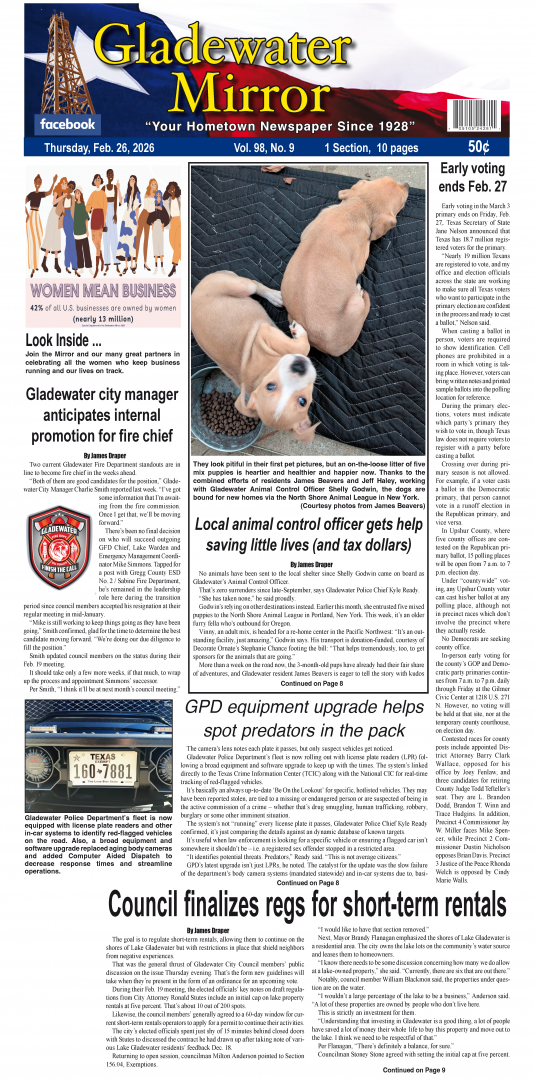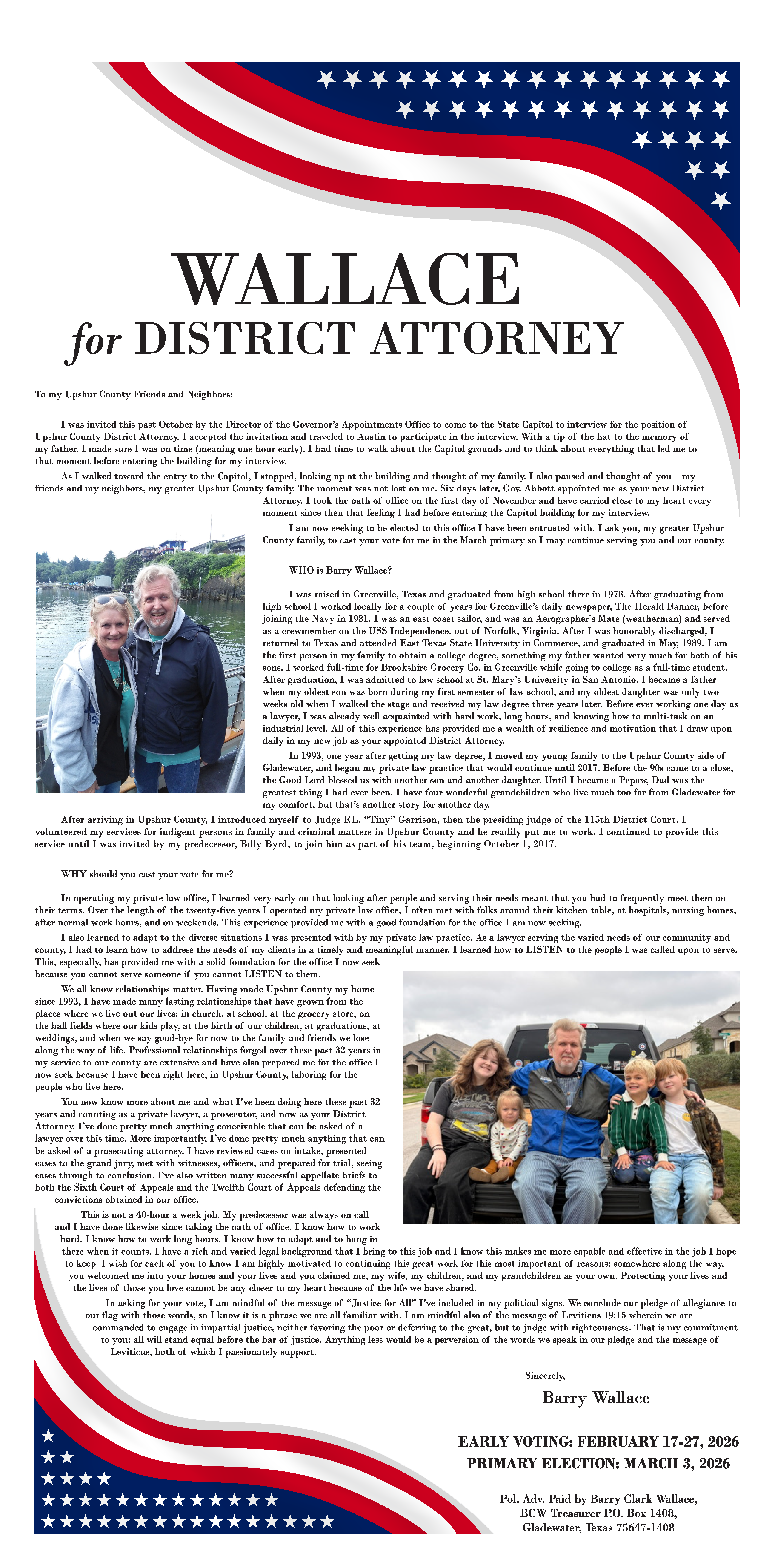AUSTIN – The Texas Parks and Wildlife Department (TPWD) encourages Texans to take action against invasive species that negatively impact the state’s natural resources and economy. National Invasive Species Awareness Week (NISAW), scheduled for Feb. 26 – March 3, is an initiative to raise awareness of the threats and provide solutions on how to prevent the spread of invasive species.
“During National Invasive Species Awareness Week, and throughout the year, we want to encourage all Texans to learn more about invasive species and take time to prevent new introductions and spread of harmful invaders to help to protect our natural resources for the enjoyment of future generations,” said Monica McGarrity, TPWD Senior Scientist for Aquatic Invasive Species.
Invasive species are non-native to an ecosystem and can cause environmental or economic damage and harm to human health and quality of life or agriculture. In addition, invasive species are expensive to control, can be impossible to eradicate once established, and can inflict costly damage to crops, fisheries, forests and more. According to recent estimates, these costs total approximately $219 billion across the United States every year. Many invasive species are spread (inadvertently or intentionally) by humans, who play an important role in preventing their spread to new areas.
A variety of non-native plants, animals, insects and even diseases can become invasive when they enter a new environment, growing or reproducing rapidly and potentially outcompeting native species, preying on them or degrading their habitat. This allows them to become established and problematic across large areas. They can be introduced by humans in a variety of ways, including intentional introduction through aquarium dumping, live bait releases or outdoor plantings, or accidentally as “hitchhikers” carried through recreational activities.
These risky recreational activities can include hauling firewood long distances for a campfire or moving a boat from one reservoir to another without properly cleaning, draining and drying it first. Once introduced, some species can harm native species and ecosystems, impact recreational activities, damage infrastructure and require costly, long-term management in cases where control is possible.
This year for NISAW, TPWD offers five actions anyone can take to help prevent or slow the spread of invasive species in Texas.
Never Dump Your Tank
Don’t dump anything — whether it’s fish, animals or plants — out of an aquarium into any of Texas’ waterbodies. The same is true for flushing them down the toilet. Whether saltwater or freshwater, there’s a good chance your aquarium fish, animals and plants are not native to Texas. If dumped into the wild, they can potentially introduce diseases and establish themselves at the expense of native aquatic life, vegetation and reef systems.
It is also important to learn before you buy aquatic life to ensure you will be able to care for the species in the future, as species sold small may reach large sizes, outgrowing their aquaria, and some may be long-lived. Being informed is particularly important when purchasing aquatic life online, as some species being sold such as common salvinia (aka “water spangles”) and water lettuce are illegal and invasive in Texas. Learn more about alternatives to aquarium release on the Texas Invasives website and about prohibited species in Texas on the TPWD website.
Similarly, you should never release any animal that you have purchased as a pet into the wild. Most likely your pet is not native to Texas and could cause serious harm to our native species and ecosystems. Find more resources on the Don’t Let It Loose website.
Use Your Bait Where You Catch It / Never Dump Your Bait
Many people don’t realize the potential impact that releasing live bait can have on aquatic life. Bait bucket introductions — anglers dumping live bait into a water body other than the one where it was caught — are an easy way we can unintentionally spread aquatic invasives—both non-native bait fish and microscopic organisms such as zebra mussel larvae in the water.
Just remember this: Don’t dump leftover bait in the water at the end of a fishing trip and don’t take live-caught bait (or any bait that’s touched lake water) to another lake to use. Instead, take your bait home to use on a future fishing trip at that same lake, offer it to another angler to use or place it in the trash.
For more information, check out this TPWD magazine article.
Plant Native
When landscaping near your home or planting a garden, it’s important that you choose plants that are native to your region. Non-native plants can escape cultivation, become invasive and have an impact on water quality, biodiversity, fish and wildlife habitats and more. Learn about great native plants to plant in your garden and find native plant suppliers on the Lady Bird Johnson Wildflower Center website.
Don’t Carry Hitchhikers
You could be carrying invasive species with you when you’re enjoying the outdoors and not even know it. Insects and plants, including plant seeds, can hitch a ride on your clothes, shoes, gear or even your firewood. You can help stop the spread by removing plants, animals and mud from clothes, boots, gear, pets and vehicles, cleaning your gear before entering and leaving recreation sites, using only local firewood and simply staying on designated roads and trails. Learn more on the Play, Clean, Go website.
Clean, Drain and Dry Your Boat and Gear
Boaters can help keep zebra mussels, giant salvinia and other aquatic invasive species from being moved and harming more lakes. We ask all boaters to take a few minutes to properly clean, drain and dry their boats and equipment before they leave a lake every time they go boating. Remove plants, mud and debris from the boat and trailer and drain all the water from the boat and gear. Once you get home, open up compartments and allow everything to dry completely.
For more information on how to properly clean, drain and dry boats and equipment, visit the TPWD YouTube channel for a short instructional video. If you have stored your boat on the water at a lake with zebra mussels, it is likely infested and at high risk for spreading this invasive species. Before moving it to another lake, call TPWD at (512) 389-4848 for guidance on required decontamination.
Learn more about aquatic invasive species on the Stop Invasives page of the TPWD website.
TPWD also encourages the public to use the Texas Invaders app or website to report sightings of invasive species, whether in your backyard or in wild spaces. Texans can learn how to identify invasive species on the Texas Invasives website.








